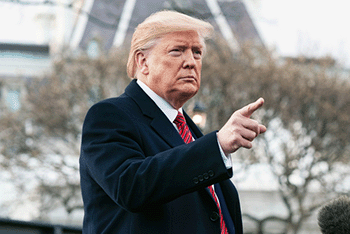President Trump’s musings on reclassifying marijuana have set off a quiet but potent tremor through the Republican Party—not because the move is unexpected, but because it reveals just how thin the veneer of ideological unity remains when power, profit, and political capital are on the line.
The idea on the table: downgrading marijuana from a Schedule I controlled substance, where it currently sits alongside heroin and LSD, to something less draconian. It’s a bureaucratic tweak with seismic implications. Reclassification wouldn’t just legitimize the booming cannabis industry—it would open the floodgates for commercial investment, medical research, and, more crucially, political donations from a sector long relegated to the legislative shadows.
There’s nothing accidental about the timing. Trump, ever the transactional tactician, is reading the tea leaves from states like Arizona, Nevada, and Michigan—places where marijuana legalization isn’t just popular, it’s practically bipartisan. The issue polls north of 60% approval nationally. And for a candidate who won in 2016 by flipping blue-wall states, this is less about ideology and more about margins.
But the backlash from the MAGA right was swift and pointed. Social conservatives, particularly those aligned with old-guard institutions like the Faith and Freedom Coalition, are treating this as a betrayal—not just of policy, but of identity. These are the same voices that rallied behind Trump’s law-and-order rhetoric in 2016 and 2020. For them, marijuana remains a cultural totem, a symbol of permissiveness and moral decay. Reclassifying it—even under the banner of states’ rights—feels like capitulation.
Yet here’s the rub: Trump doesn’t owe these people much anymore. He’s already cleared the Republican primary field. The evangelical base, despite its protestations, has nowhere else to go. And the MAGA movement, as it evolved, became less about moral purity and more about flexing muscle against the institutional elite. In 2025, “owning the libs” carries more weight than abstaining from THC.
That’s not to say Trump is acting on principle. This is a strategic play with multiple payoffs. First, it allows him to poach younger, disaffected voters—particularly libertarians and independents—who might otherwise stay home or flirt with third-party options. Second, it places him in stark contrast to the Biden-era Democrats, who, despite all their posturing, failed to deliver on marijuana reform when they held both Congress and the White House. Trump can now outflank them on an issue they gift-wrapped but never unboxed.
Then there’s the money. The cannabis industry, now worth tens of billions, has been waiting for a federal green light to pour cash into campaigns and lobbying efforts. A reclassification would be the spark. For a Trump campaign that thrives on unconventional funding streams and outside-the-box coalition building, the weed lobby is a ripe, underutilized asset.
Of course, none of this is without risk. The Republican Party is still home to a sizable contingent of drug-war diehards. If Trump pushes too hard, he risks energizing primary challengers in down-ballot races or sparking a media cycle that paints him as inconsistent—something his enemies are always eager to exploit. But Trump’s calculus has always been rooted in dominance politics. He doesn’t need unanimity; he needs submission. And the GOP has proven, time and again, that it will fall in line if he delivers results.
Expect a carefully choreographed rollout. The administration will lean on “medical research” talking points, probably trot out a few veterans’ groups to talk about PTSD treatment, and frame the move as a deregulation win—freeing businesses from outdated federal constraints. The reclassification will be sold not as a cultural shift, but as a rational, modern policy update.
The real story, though, is what this signals about Trump’s second-term priorities. He’s not looking to replay the hits from 2016; he’s adapting the playbook. Marijuana reform, once the exclusive terrain of progressive activists and libertarian oddballs, is now a wedge issue Trump can use to fracture the Democratic coalition, embarrass his critics, and solidify his grip on a party that increasingly follows his lead, not his ideology.
As always in Trumpworld, the chaos is calculated. And while the MAGA purists may grumble, they’ll march—because they know the alternative isn’t a return to principle. It’s irrelevance.
Click this link for the original source of this article.
Author: rachel
This content is courtesy of, and owned and copyrighted by, https://www.nationalinsiders.com and its author. This content is made available by use of the public RSS feed offered by the host site and is used for educational purposes only. If you are the author or represent the host site and would like this content removed now and in the future, please contact USSANews.com using the email address in the Contact page found in the website menu.








